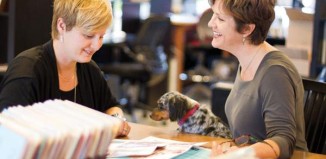It was on a car ride in Hays County that Rebecca Benz had a moment of Zen related to her job. Benz, the executive director of Camp Fire USA ’s Balcones Council, was escorting a group of middle school students on a camping trip–the kids’ first. Leaving San Marcos, the car traveled along a stretch of road called the Devil’s Backbone, which is well known for its scenery and decidedly un-San Marcos-like feel. Benz said she listened with a smile to the exclamations from her passengers upon seeing the view, some of whom couldn’t believe they were still in Texas.
Coming back from the trip, one girl mused about the experience. “It’s hard to imagine how big the world really is.”
“I thought to myself, what a special moment, for a young person to have that kind of insight, and have her world expanded,” Benz said. “I felt honored to be there in the moment with her.”
Camp Fire USA is all about expanding young minds. Officially, its mission is to build confident, caring youth and future leaders by providing family-oriented learning and outdoor opportunities. It’s also an organization that welcomes all families, period. Benz said Camp Fire USA, which has its roots in the 100-year old camp Fire Girls organization, has always been a widely inclusive organization. Camp Fire Girls, which was expanded to include boys in 1975, adopted a statement in 1954 calling for greater inclusiveness of all groups within all segments of the membership.
“That policy of inclusion is not just policy for us; it’s a walking, talking daily practice,” Benz said. “And hopefully when families come to camp Fire they’ll see families like them, and also very different than them, and make friends.” Benz said the Balcones council of Camp Fire USA, which encompasses 10 central Texas counties, has a wide range of families among its membership.
For Abby Gilfillan, her wife Gina Terrell and their three kids, the Balcones Council of Camp Fire has played an important role in their lives. They first became involved when their son, Will, now 13 years old, was in kindergarten. The Boy scouts had been doing after-school activities at his school, and Will wanted to get involved. At the time, that organization had publicly stated that gay and lesbian parents wouldn’t be welcomed as troop leaders, and the family wanted to find a more appropriate fit for them.
Now Will is 13, and along with his two siblings and his parents, still participates in camp Fire activities. Gilfillan has led groups and backpacking trips with Camp Fire’s Balcones council, and the family has also participated in community-wide activities from river cleanups to puppet shows at libraries.
“It’s made a big impact on our family,” Gilfillan said of the organization’s inclusiveness.
“Through Camp Fire we feel connected to our community through our family. We’ve always been just another family in camp Fire, and it’s really important for our kids to get that feedback, to feel like their family is special and important and part of the community.” The organization has also done a great job of teaching their kids about being part of a larger community, she said, and empowers them to be good citizens.
Gilfillan and Terrell’s kids range in age from 15 to 6, but Gilfillan said all the kids, even the older ones, remain active in Camp Fire–no small feat, especially with the range of activities that vie for a teenager’s attention.
Benz is well aware of the number of, and the shifting nature of, influencing factors in kids’ lives. Citing a study that each year examines the top influences in children’s lives, she said that from 1950 to 2000, those top five consistently included family, school, television, church and peers. But in 2000, the internet, video games and movies shot up to the top of the list.
“If the average kid is in front of a screen seven hours a day, that has to have some impact on their physical and mental health,” Benz said. “We would like to see more balance. Screen time is here, and it’s a good thing. It’s how our kids are communicating and learning…camp Fire gets the whole family engaged in creating more of that balance.”
To that end, Camp Fire USA ’s Balcones council is involved in the Texas Partnership for children in Nature, a public-private partnership formed by a bipartisan group of legislators. The Partnership created a strategic plan with the goal of increasing opportunities for children to connect with nature and learn outdoors.
“I’ve heard from dads who have only daughters that they love camp Fire because they can do things with their girls. I’ve heard the same thing from women with sons…and from families with same-gendered parents, I’ve heard that it’s not just an organization for gay and lesbian families, that your family is with all different families,” Benz said. “We have grandparents raising kids, foster families, single parents, married parents, everyone.”
Benz pointed out that camp Fire doesn’t own land, so it uses public land for trips and activities. Its programs also involve the whole family.
“So often kids go off to camp, and when they come home they want to go camping. Often parents say they don’t know where to go, or they don’t know how to camp. So the child has an important experience, but it’s separate from the rest of the family,” Benz said. “Whereas in camp Fire, the whole family is out there camping together, and on public property. So they can go back and go camping again.”


































